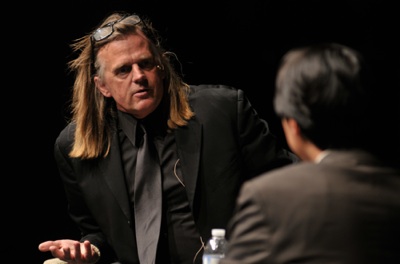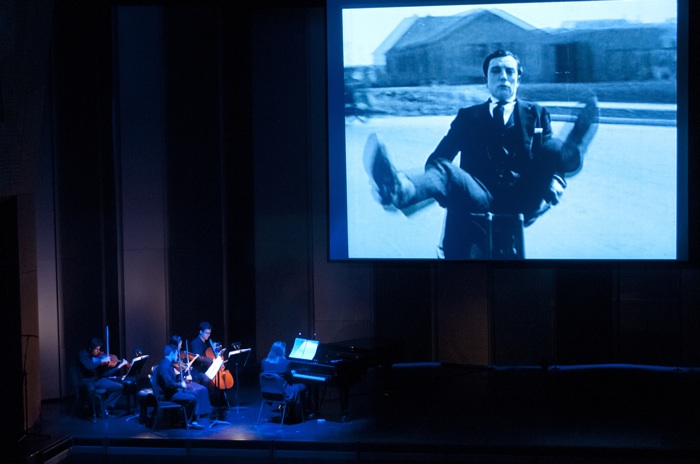
The high art of low humor.
Among numerous chamber recitals and offerings at this summer’s ambitious Music@Menlo Festival, the encounter session with composer/pianist Stephen Prutsman stood out as particularly mischievous.
Prutsman, a one-time keyboard player for art-rock bands, also carried on a distinguished career on classical music stages. And as part of his third career as a composer (he has written extensively for the Kronos Quartet and others), he recently branched out into writing scores for silent films.
On Thursday, June 26, a large screen was lowered over the stage, and flickering black and white silent comedy greeted a crowd that usually comes for chamber music. And there was music, a live score composed and performed by Prutsman with clarinetist Jose Franch-Ballester and the Escher Quartet. In between playing for Charlie Chaplin’s One a.m. and Buster Keaton’s Sherlock Jr., Prutsman was interviewed on writing music for film by Festival Artistic Administrator Patrick Castillo. His serious attention to technique only added to our enjoyment of immortal pratfalls and commedia-style caricatures.
Patrick introduced Prutsman, and described his musical start—playing piano for Sharkey’s Pizza at the age of 13—and then got down to business. “What separates music for film from regular writing?”
“The use of simplicity. I once was standing in at a sound studio, and he wanted me to play a very simple phrase. I tried to throw myself into it and give it all this emotion and he kept shaking his head. Finally he said to try for childlike, and I did it completely simple and it worked. (Demonstrates each at the piano). The use of simplicity…that and following the inner ear, sounds that can never be realized.”
“What do you think is the most important element [of scoring for film]?”
“Finding the emotional attachment in the piece. That is first.”
“Finally, what’s funny in music? What’s dangerous? What’s sexy?”
“What’s funny? A surprise element in relationships, like quirky rhythms or intervals. In the Buster Keaton what’s really funny is minor seconds.” He then demonstrated three quick pairs of adjacent notes, sounding like he was tripping his way up the keyboard.
“What’s scary is sudden dynamic changes. You know in the Jaws score when the shark theme comes in? The woofer is cranked up and you can feel it in your gut. That’s scary. But sometimes the shark doesn’t even appear. They fool you.”
“What’s sensual is minor subdominant and French harmonies. For some reason, that does it for a lot of people.” (Demonstrates at the keyboard, then turns, raises an eyebrow, and smiles.)
He offered more tidbits for hopeful film composers, like the importance of silence, and then the Escher String Quartet came onstage, the lights dimmed, and we were treated to Buster Keaton as melancholy fool.
Violinist Adam Barnett-Hart took the theme, nostalgic and jazzy and then suddenly modern with hisses and harmonics. It was broadly done, fluent in genre from honky-tonk to Haydnesque, and phrased to each film action. Prutsman eyed the screen above him as he played dark rumbles and romantic French harmonies, and the strings eased in with counter themes and sudden accords.
Swooning strings greeted the heroine, menacing intervals the villain, and playful motifs heralded our bashful hero. The characterizations were as sharply cut as any Italian buffa, and with an insight into human nature that was startling in its timelessness.
Also surprisingly modern, Keaton’s silent film included a dream sequence, with strings slithering into harmonics over soft piano chords.
An old hand at audience participation, Prutsman had us practice our cheers and boos beforehand. Many of us were already warmed up from Charlie Chaplain’s short, with piano slides and clarinet shrieks describing drunken slides down the stairs and one-and-a-half-gainer pratfalls. In that, clarinetist Jose Franch-Ballester not only delivered sublime comic timing, but improvised to Prutsman’s lead.
One hopes that future Music@Menlo’s will continue to explore the serious art of comedy. Seriously!
—Adam Broner
Photo top of Stephen Prutsman interviewed by Patrick Castillo; bottom, of Sherlock Jr with Prutsman and Escher Quartet performing; photos by Tristan Cook.

